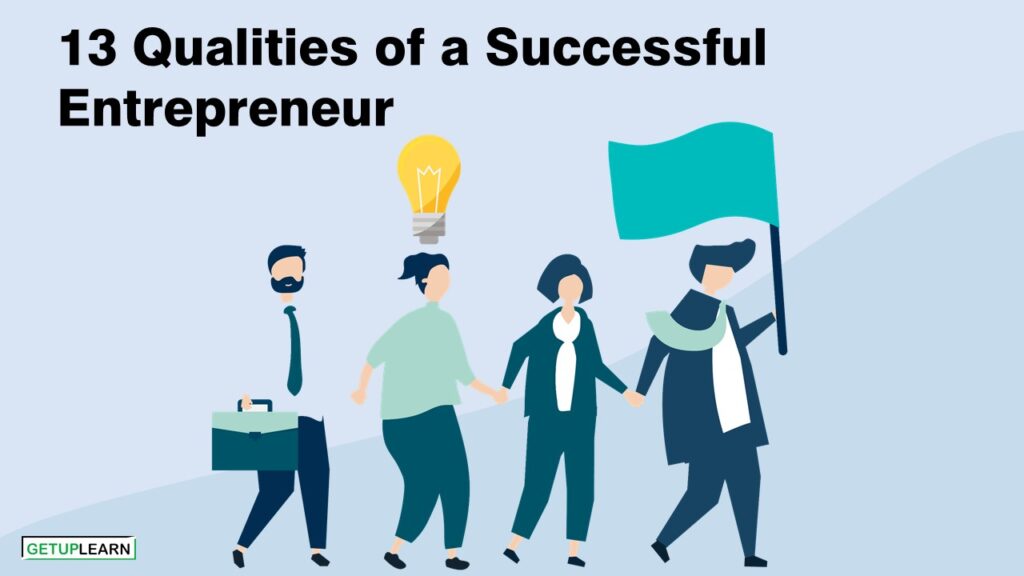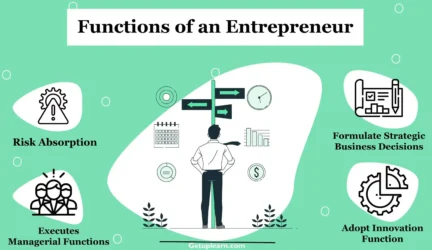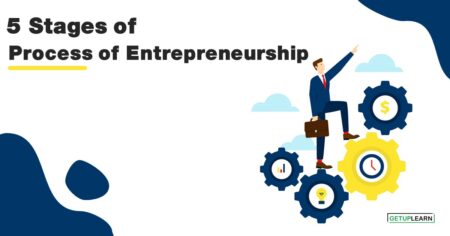These personal traits make an entrepreneur a successful person. However, it must be stated that no entrepreneur possesses all these strengths. No entrepreneur is born with all these traits. He can acquire these traits if the environment is suitable for this purpose.

Table of Contents
-
1 13 Qualities of a Successful Entrepreneur
- 1.1 Initiative
- 1.2 Seeing and Acting on Opportunities
- 1.3 Persistence
- 1.4 Information Seeking
- 1.5 Concern for High Quality of Work
- 1.6 Commitment to Work Contract
- 1.7 Efficiency Orientation
- 1.8 Systematic Planning
- 1.9 Problem-Solving
- 1.10 Self-Confidence
- 1.11 Assertiveness
- 1.12 Persuasion
- 1.13 Use of Influence Strategies
- 2 FAQs Section
13 Qualities of a Successful Entrepreneur
While one can add another factor to the list of entrepreneurial competencies, the said competencies appear to be major ones: An integrated view of the qualities of a successful entrepreneur can be listed as follows:
- Initiative
- Seeing and Acting on Opportunities
- Persistence
- Information Seeking
- Concern for High Quality of Work
- Commitment to Work Contract
- Efficiency Orientation
- Systematic Planning
- Problem-Solving
- Self-Confidence
- Assertiveness
- Persuasion
- Use of Influence Strategies
Initiative
When can we say that a person has initiative? When he/she takes action that goes beyond job requirements or the demands of the situation? When he/she does things before being asked or forced to by circumstance and acts to extend the business into new areas, products, or services.
Most of the successful entrepreneurs show this competency in some form or the other. They, on their own take decisions to launch their enterprise or expand and grow.
| Example |
| Nikhil was standing near the sea wall at Marine Drive in Bombay along with a number of people: A boy who had bent too much on top of the wall fell in the water and started drowning. People shouted but did not do anything else. Nikhil jumped into the sea swam out and saved the boy. Nikhil took the initiative which brought out some hidden skills in him. |
| Rasiklal Zaveri was a successful businessman trading/dealing in spices. He was rich and well-established. But he felt that this was not enough. He decided to produce some mixtures of the spices by processing them and setting up a unit grinding processing and packaging them. He did this although it was not required and he succeeded. |
Seeing and Acting on Opportunities
Look for and take action on opportunities. When a person sees and acts, on opportunities, either business or personal growth, or seizes unusual opportunities to obtain finance, equipment, land, workspace, or assistance.
| Example |
| There is a case of a film distributor in Jamshedpur, Mr. Nair. The story of how he became a distributor is interesting. He was working for TISCO at Jamshedpur. One day, he met the Secretary of one ‘United Club’ in the town, who asked him whether he could help him in getting a movie to show in his club as he had difficulties in procuring it. Nair agreed and went to Calcutta to get the movie. There he met an acquaintance who was connected with the film line; on being asked Nair told him the reasons for his visit. The acquaintance offered to help him, but Nair refused and still collected names and addresses of some distributors, He then went to a well-known firm of distributors, got a movie for Rs.5,000/, and gave it to the club for Rs.7,000/. This started him off and he began supplying movies to that club and other movie theatres in Jamshedpur. Gradually the work increased and he established an office in Calcutta and became a full-time distributor. |
Persistence
Takes repeated action to overcome obstacles that get in the way of reaching goals. This is a very important competency. As an entrepreneur your path may not be smooth, you might face difficulties, but you have to develop the qualities of a spider and carry on without getting disheartened. And finally, success will be yours.
Now you know what persistence is, and what you can learn from the example.
| Example |
| Look at the case of Leela. She decided to set up a unit manufacturing FRP products. She purchased land and engaged a firm of contractors for the construction of the building. As luck would have it the watchman engaged there got murdered (some personal enmity) and the contractor’s workers panicked and left the construction work. Somehow she managed to get the construction completed. Much later by the time she could start production FRP technology had changed and she hardly had any orders. As a result, she defaulted in payment of interest to the financial institution which had extended financial assistance in initial investment. But did she lose heart? No, she sold the land and building paid the financial institution salvaged the machinery shifted it to a rented place, and started again. |
Information Seeking
Takes action on getting information to help reach objectives or clarify problems. A person does research on how to provide a product or services, consults experts for business or technical advice, seeks information for what is needed, and uses contacts or information networks to obtain information.
When you set out to put up your own enterprise, you will not know everything. You will have to gather information from elsewhere and acquire the knowledge. You will have to get help from experts and refer to books and journals.
| Example |
| Shreyas Gandhi of Gujarat is a successful manufacturer of office equipment mainly inter-communication systems. But as he puts it in electronics one has to be on one’s toes all the time as it is a fast-changing line. So he has constantly to be on the lookout and search for other products and gather information about them. And he does that by reading several electronic magazines available in India. These magazines and information on market conditions help him in deciding whether he should go for a change and when. For example: when he found that T.Vs. as a communication line were coming up very fast he planned to manufacture TVs. |
So once you have set up your industry and established yourself, do not sit back and relax but be up to date on information about the line of your choice.
Concern for High Quality of Work
Acts to do things that meet or beat existing standards for excellence. Such persons always have a desire to produce work of high quality and to favorably compare one’s own work to that of others. This would help you not only to stand the competition, create or expand your market, but also give you a sense of sat is faction and achievement.
| Example |
| Take the case of Gopukumar. He is an architect. He started with designing private residences and graduated to designing big hotels and shopping complexes. What has made him successful and popular is the fact that he believes in giving high-quality work and is meticulous about each and every detail of the design. He never compromises on quality and has self-set standards of excellence which has earned him a reputation in the building construction line. |
Commitment to Work Contract
Places the highest priority on getting a job completed. Makes a personal sacrifice or extends extraordinary effort to complete a job. Or accepts full responsibility for problems in completing a job for others and pitches in with workers or works in their places to get the job done and expresses a concern for satisfying the customer.
A successful entrepreneur not only provides quality goods and keeps up-to-date information about his product but he/she is also particular about keeping to the delivery-time schedule and satisfying a customer. He/she would go to any lengths to make any required effort to complete work in time.
| Example |
| Agnes Kottoor is a woman entrepreneur manufacturing optical lenses in Kochi. She employs about a dozen female workers and has built up a good clientele. Kerala is known for load shedding and power cuts. Agnes also has to suffer due to this. During day time there would be power cuts and so obviously the work would have to stop and as her workers are all girls, they have to be allowed to go home on time. But what about timely delivery to the customers? Agnes is very particular about that. So what does she do? She herself works on the machines, grinding the lenses, sometimes up to 2 a.m. in the morning, and finishes the work. That is an example of a commitment to a work contract. |
Efficiency Orientation
Find ways to do things faster with fewer resources or at a lower cost. Such a person looks for ways to reduce costs and time, uses information on business tools to improve efficiency, and expresses concern about costs against the benefits of any improvement or change.
It is not enough merely to manufacture produce and sell. A successful entrepreneur always thinks of ways in which he/she can improve the product or service, innovate, and reduce costs wherever he/she can. That is efficiency orientation.
| Example |
| Shreyas Gandhi of Ahmedabad is a successful trader in intercoms, calculators, refrigerators, vacuum cleaners, air conditioners, and other electronic equipment. His planning for inventory and market is good. Shreyas Gandhi deals in approximately forty items, the market requirement for each is different and he wants to ensure that he does not overstock and increase his interest burden. At the same time, he does not want to understock, in which case he would not be able to satisfy his customers. So, he engaged an institute of management to conduct a survey of the market for his items which would enable him to assess the minimum level of stock he should keep for each item. Certainly, this is an efficient way of productive operations. |
Systematic Planning
Develops and uses logical step by step plans to reach goals. He/she plans by breaking a large task into sub-tasks, develops plans that anticipate obstacles, evaluates alternatives, and most importantly takes a logical and systematic approach to activities.
As you know when you set, or when you are in the process of setting up your venture, if you plan everything systematically and go step by step, half the battle will be won. Not that there would not be any difficulties, but your planning will enable you to deal with them. You can see from the following example how Mr. Chandy Sam planned step-by-step to reach his goal and achieve it.
| Example |
| For systematic planning, one can refer to Chandy Sam of Trivandrum. Chandy lost his father while still in college. Though he was still a student he had a hobby of repairing electrical and mechanical items. Due to his father’s demise, he had to leave his studies and here his hobby helped him. He started a service chain for repairing refrigerators and air conditioners. But what he really wanted to do was to go into manufacturing. He ‘started planning and preparing himself for this. He first tried to find out what equipment he could manufacture which would involve low investment, less machinery, and a good market in Kerala. He observed and studied various equipment even imported freezers. He read up on the subject and referred to technical material. And then made one or two models of freezers based on the imported one. He could sell them at a low price and low profit. He received more orders and needed money for machinery and working capital. Though he could not furnish collateral security, he finally could convince bankers by showing them the few freezers he had already manufactured. The loan was sanctioned. He started the production of freezers and innovative voltage stabilizers: Slowly he headed for new products. Today he manufactures refrigerators, water coolers, air conditioners, and combination coolers, and has a high turnover. |
Problem-Solving
Identifies new and potentially unique ideas to reach goals. Switches to an alternative strategy to reach a goal, and generate new ideas or innovative solutions. Everyone faces problems in life, and more so if you happen to be an entrepreneur.
It is important that as an entrepreneur you have to have a problem-solving attitude and not a problem avoiding one. Problems are bound to occur during the life of your enterprise, so if you have or develop this competency, the life of your enterprise will run smoothly.
| Example |
| George Thomas of Kerala had taken entrepreneurship development training from EDI and was all set to start production in his engineering unit. The building was ready machinery had been installed and raw materials stocked. There was however one snag. He had not yet received a power connection. Countless visits to and voluminous correspondence with the Electricity Department had not produced any results. The problem was how to procure it. He thought and came up with a solution. He printed cards inviting people for the inauguration of his unit (dated 3 days later) stating that the Chief Minister of the State would be inaugurating it (This with the tacit agreement of P. S. to the Chief Minister). He then went and showed the card to the concerned official of the Electricity Department. The next day he got the power connection. |
We don’t say that you have to resort to such means to solve a problem, but you have to bear in mind that you should be a problem solver – if you already are, develop yourself.
Self-Confidence
Has a strong belief in self and own abilities. Expresses confidence in own ability to complete a task or meet the challenge. He/she sticks with his own judgment in the face of opposition or early lack of success or does something that he/she finds risky. If you have self-confidence in yourself and your abilities, you can succeed in whatever you do.
When you take up any task and if you have confidence in yourself that you are capable of doing it well, you can accomplish it in a much better fashion. Do we need an example here? Every successful person has self-confidence. You have to believe in yourself.
Assertiveness
Confronts problems and issues with others directly. Confronts problems with others directly, tells others what they have to do and disciplines those failing to perform as expected. Assertiveness is “not to be confused with aggressiveness.
Aggression can be direct or indirect, honest or dishonest but it always communicates an impression of superiority and disrespect. While assertive behavior is active, direct, and honest. It communicates an impression of self-respect and respect for others. This behavior leads to success without retaliation and encourages honest, open relationships.
| Example |
| Let us look at the following three examples of conversation: 1. “Only an idiot would think of a solution like that! Don’t you even think before you talk?” 2. “You know, maybe we might want to think about a different alternative. What do you think?” 3. “I am not completely comfortable with your solution. Will you please develop at least one more option?” Number one is an example of aggressive behavior, number two of non-assertive behavior, and number three is a good example of assertiveness. It is honest, respectful and invites co-operation |
Persuasion
Successfully persuades others. An entrepreneur is said to be persuasive when he/she can convince someone to buy a product or service to provide financing or to do something that he would like from the person. He/she asserts own competence or the company’s qualities or strong confidence in his own or the company’s products or services.
If you, as an entrepreneur, cannot or do not convince others about the viability of your project or product or your own capabilities, how can you make a successful entrepreneur? To possess this competency is therefore very important for you. This competency is also interlinked with ‘self-confidence’. If you have self-confidence, only then you can persuade/convince others and get your work done.
| Example |
| Persuasion can be of different types. Jayabharati a women entrepreneur was refused loan by a bank as it felt that her project was not viable and she had no managerial skills. At the end of numerous visits to the Bank Jayabharati could convince the Bank about both and her loan was sanctioned. |
| Persuasion can be of different types. Jayabharati a women entrepreneur was refused a loan by a bank as it felt that her project was not viable and she had no managerial skills. At the end of numerous visits to the Bank Jayabharati could convince the Bank about both and her loan was sanctioned. |
Use of Influence Strategies
Use a variety of strategies to influence others. Such an entrepreneur acts to develop business contacts, uses influential people to accomplish his/her own objectives, limits the information given to others, and uses strategies to influence others.
| Example |
| Kalindi is an entrepreneur who manufactures paper napkins for use in hotels, restaurants, and bars. She has customers in all the southern states and is now well-established. There was a time before she had set up her unit when she could not get a loan from any bank in her hometown, Bangalore. But, she did not give up. Fortunately for her she knew the president of the Association of Women Entrepreneurs of Karnataka (AWAKE). The president of AWAKE is a very influential and resourceful person and could get the loan sanctioned from a scheduled bank. (Here Kalindi used her contact to get her work done). |
So, now you know what these competencies are and how important they are for you as a potential entrepreneur.
FAQs Section
What are the qualities of a successful entrepreneur?
The following are the qualities of a successful entrepreneur:
1. Initiative
2. Seeing and Acting on Opportunities
3. Persistence
4. Information Seeking
5. Concern for High Quality of Work
6. Commitment to Work Contract
7. Efficiency Orientation
8. Systematic Planning
9. Problem-Solving
10. Self-Confidence and more.




